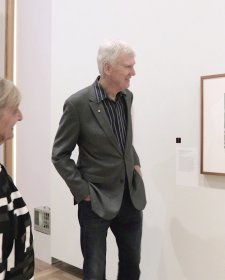By the time I finish a play now, it’s usually fairly close to what’s performed, there’s not much alteration now. I think I know what I’m doing now.
I basically start from a situation and the characters in the situation. My plays are plays about character rather than plays about theme. I don’t start off with a thesis and construct a play around that thesis, I start off with characters and try and follow the logical paths that those characters would follow in the play. So, sometimes I start with an outline. What If You Died Tomorrow? started with a fairly close three-page outline. Sometimes, I – as in The Removalists – I start from the situation and see where that situation leads. The Department: the very first rough draft started from a listing of the topics on the agenda. The latest play, A Handful of Friends, started from an initial scene. So, I haven’t got a clear-cut way of going about it, except that the first draft is invariably the biro-written one, very very rough and I expect it to be. I’d rather be fluent and let it all come out in that first draft and then refine and refine later on.
When you’re writing from character, some of it’s intuitive. You just feel I know, I know my character well enough now, I know what he’ll do in a situation, I know how he’ll react. You keep referring back to reality to try and get a check on the types of behaviour, you say, ‘Now when I was in that situation, or when Fred was in that situation, what sort of way did they react to this?’, and so you keep referring back, but essentially, once your characters are under way, you just intuitively feel them and what they’ll do.
Sometimes the structure grows, I suppose the word is ‘organically’.
I love watching political processes at work, I really love watching power struggles and the way people use language as an instrument of power, as an instrument to gain power, prestige, status, love, whatever they want out of life. I’m primarily interested in the way people relate to each other and use language to do it.













